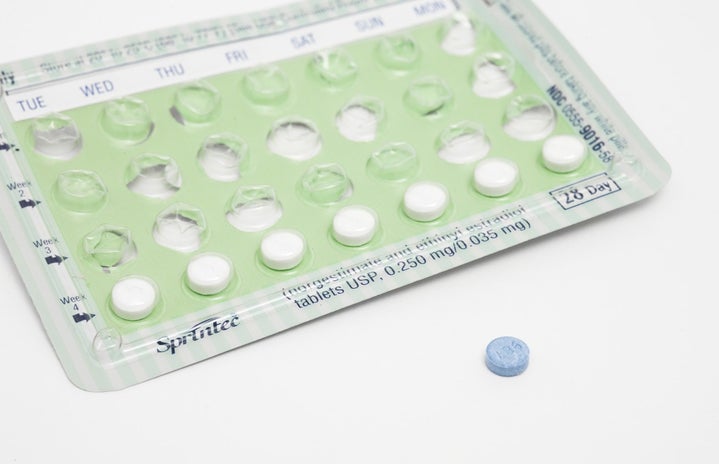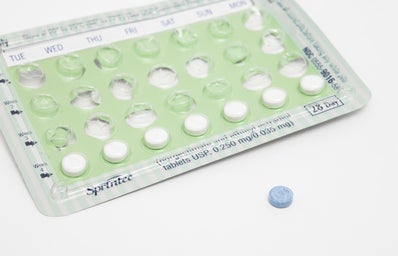Practicing safe sex is extremely important, nobody wants an STI or unplanned pregnancy. This is where contraceptives some into the picture, but there are so many types it is hard to know which one is the best fit for you. I have gathered some information talk about the different types of contraceptives, but I am not a doctor so please make sure to consult your doctor beforehand.
The Pill
This is probably the most well known and most commonly used type of birth control. The pill is 99.7% effective and you use it by orally ingesting one pill per day at the same time every day. Each pill pack comes with a month’s worth of pills, three weeks of the actual contraceptive and one week of placebo pills. The placebo pills are used so you can have your period. This is a good option for those who want to regulate their periods or symptoms such as cramps or acne.
I personally had a pretty bad experience with the pill, but I know people that love it. The main cons I experienced were the side effects. Some of the side effects include nausea, lightheadedness, mood changes, depression, and spotting. I experienced pretty extreme nausea and dizzy spells, but each experience is different for every single person. Another con I experienced was trying to remember to take it at the same time every day. I am super forgetful and forgetting to take it one day usually resulted in spotting. But again, some people love it, it affects every person differently!
The Nuva Ring
This works by self inserting the ring into your vagina. It stays there for 3 weeks and you remove it for 1 week, which is typically the time for your period. Some people say they can feel it, but most can’t. The most common side effects include increased discharge, low sex drive, nausea, breast tenderness, and irritation of the cervix. There is also the possibility of Toxic Shock Syndrome, most people associate this with tampons, it is rare but it can be fatal.
Most women like using it because it is self inserted and pretty low maintenance. If the directions are followed exactly it is 98% effective, but after researching typical use, the effectiveness is about 91%.
Nexplanon
This is the most effective coming in at 99.9%. I currently have this one and it is amazing. When I first got it implanted in my arm there was some serious bruising. Not going to lie it was pretty ugly, but after a few weeks, it went away. This method lasts 3-5 years and is great because it is extremely low maintenance. There are a couple of side effects though including weight gain and irregular bleeding. Obviously it affects everybody differently but weight gain is a pretty universal side effect from everyone I know personally. There is also the chance of irregular bleeding. For some, it can cause periods to last a whole month and for others, there’s no period for three years. If the bleeding becomes too much, some doctors will advise you to take the pill on top of it to stop the bleeding, but this varies from case to case. A great thing about it is once it is removed, your fertility almost instantly goes back to normal, so if you plan on getting pregnant, it will not cause you any difficulty.
IUD
The IUD is about 99% effective. It is inserted into the vaginal canal by a gynecologist and lasts about 6-12 years. This method is great because, just like the Nexplanon, you don’t have to think about it once it’s in and you can have it removed at any point. Another great thing about it is the effectiveness stays the same, there is no user error like there is for the pill or condoms. It can be a bit expensive though, depending on your insurance it can cost anywhere between $0 and $800. The side effects include irregular periods, abdominal pain, and greasy or acne-prone skin. If you are prone to vaginal infections such as yeast infections or UTIs, this probably isn’t the best option for you.
The Shot
The shot, commonly known as the Depo Injection, is injected into your arm by your doctor every three months. With typical use, it is 94% effective. Many women like it because it is cheaper than alternatives, and it can make your period disappear. The side effects include weight gain, acne, and stopping your period. However, many people say they don’t get any side effects. The cons include having to make regular doctor’s appointments to get the shot (the shot is very time sensitive so a rescheduled appointment will throw off the hormones), if you’re a baby like me, shots hurt, and it takes a year or more for your fertility to fully come back. The last one not really being a con unless you want to get pregnant sooner.
The Patch
This works by placing the patch either on your arm, shoulder, abdomen, or hip. You leave it on for one week before putting on a new one. Typically you wear it for three weeks and remove it for one week. This is the week you get your period. The patch is about 92% effective with typical use.
The pros of this method are only having to think about it once a week, decrease in acne, fewer cramps, and it can even lower your risk of developing ovarian cysts.
The cons include it being visible, the patch is pink “flesh” toned. I assume it was designed for a Caucasian, without considering how it would look on darker or olive-toned people. Another con is that you have to switch the placement. If you put the patch on the same area two or more weeks in a row it can cause irritation of the skin.
Condoms
One of the biggest pros of condoms is the fact that they have no side effects. They are also extremely easy to get, you can buy them at virtually every store. However, insurance doesn’t cover the cost of condoms so consistently buying packs in bulk can become spendy. It is also typically only 85% effective, but this is the only option that prevents STIs as well as pregnancy, so it is a good idea to wear a condom in conjunction with your chosen method of birth control. Condoms also come in a variety of forms, there are latex and non-latex versions, different sizes, textures, and even flavors. There are also female condoms and dental dams.
Just remember it is always important to consult a doctor and do your research before deciding if birth control is for you. Also, a lot of the information in this article is based off of personal experience or someone else’s experience. Birth control affects everybody differently and it can be amazing for someone else, yet affect you very negatively. Remember to listen to your body, you know yourself a lot better than I do.
Stay safe ladies,
HCXO


